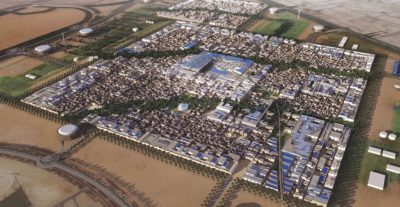
Saudi Arabia now using more reverse osmosis desalination in the Kingdom over any other water processing method.
Like neighboring Kuwait, where virtually all supplies of fresh water comes from desalination, the Kingdom of Saudi Arabia has now reached a level of need for fresh water in which it requires at least $50 billion of investments in new desalination plants to meet its growing fresh water needs. This revelation was reported in the Saudi Gazette. To help bring their needs to market, sesalination and other regional technology issues are part of the 4-day Saudi Water and Power Forum (SWPF) 2010 which began earlier this week. Based on the theme of “Sustainable Prosperity Through Knowledge, Innovation and Cooperation” the held at Jeddah Hilton is aimed at being part of a “catalyst for change.”
 Inside a reverse osmosis desalination plant, Israel.
Inside a reverse osmosis desalination plant, Israel.
The Forum is being attended by water and energy experts from around the Middle East North Africa economic region, and helps to point out the urgency in finding solutions to the water scarcity issue which has become “one of the biggest challenges facing the Arab World at the present time,” according to Dr. Mahmoud Abu Zeid, former Egyptian Minister of Water Resources and Irrigation and Chairman of Arab Water Council.
In addressing the Forum participants, Dr Abu Zeid gave them these sobering facts:
“The volume of water renewed annually is about 335 billion cubic meters, while the amount of groundwater (in the Arab world) is estimated at 143 billion cubic meters, and that the agricultural sector alone consumes about 89.5% of the water, while domestic purposes consumption accounted for 8.6% and industrial purposes accounted for 7.3%”.
In regards to the use of desalination to produce fresh drinking water, which is a very energy intensive process, Dr. Abu Zeid said that Saudi Arabia produces about 30% of world’s desalinated water, and that per capita share of water in the Arab region is about 1060 cubic meters per year, while it is about 177 cubic meters in the GCC (Gulf Cooperation Council) countries.
Investing large sums for the building of new desalination plants in the Kingdom is probably easier than in other locations, due to large revenues still being earned from oil and natural gas by the Saudi government, which is composed of members of the Saudi Royal Family, who still hold the controlling power in this country.
Many desalination plants already built in the Kingdom have been joint ventures with other countries, and even includes an agreement for a joint Saudi and Japanese plant to construct the equipment needed for building additional desalination plants as well as maintaining existing ones.
As mentioned in the Saudi Gazette, most desalination in Saudi Arabia is through multi-stage flashing, using counter current heat exchangers. Reverse osmosis has emerged as an important water desalination technology and is growing at a rate of 20 percent annually.
Saudi Arabia and IBM are planning to build a solar powered desalination plant featuring ultra-high concentrator photovoltaic (UHCPV) technology.
The worldwide desalination market is estimated to be worth $105 billion over the 2010-16 year period with 50-60 percent of which to be directed toward the Middle East North Africa region. At present, Saudi Arabia, the UAE, Kuwait, Qatar, Bahrain, Oman, Iraq and Iran account for about 40 percent of the world’s desalination capacity, according to reports in the Global Water Intelligence tracking site DesalData .com.
While environmentalists don’t generally support the energy-intensive processes involved in desalination, there are certainly business opportunities to be made in Saudi Arabia for investors around the globe.
More articles about Saudi Arabia and Gulf Region desalination projects on Green Prophet:
Japan and Saudi Arabia Plan Giant Desalination Equipment Plant
Saudi Arabia to Replace Oil With Sun Power for Desalination Plants
Kuwait Water Worries Reminiscent of Other Gulf Region Countries
Above image: The Shuaibah IWPP steam power plant with integrated seawater desalination facility in Saudi Arabia. Siemens Energy built the power plant as a turnkey project together with its consortium partner Doosan Heavy Industries & Construction Co. Ltd. for Shuaibah Water and Electricity Company (SWEC).



